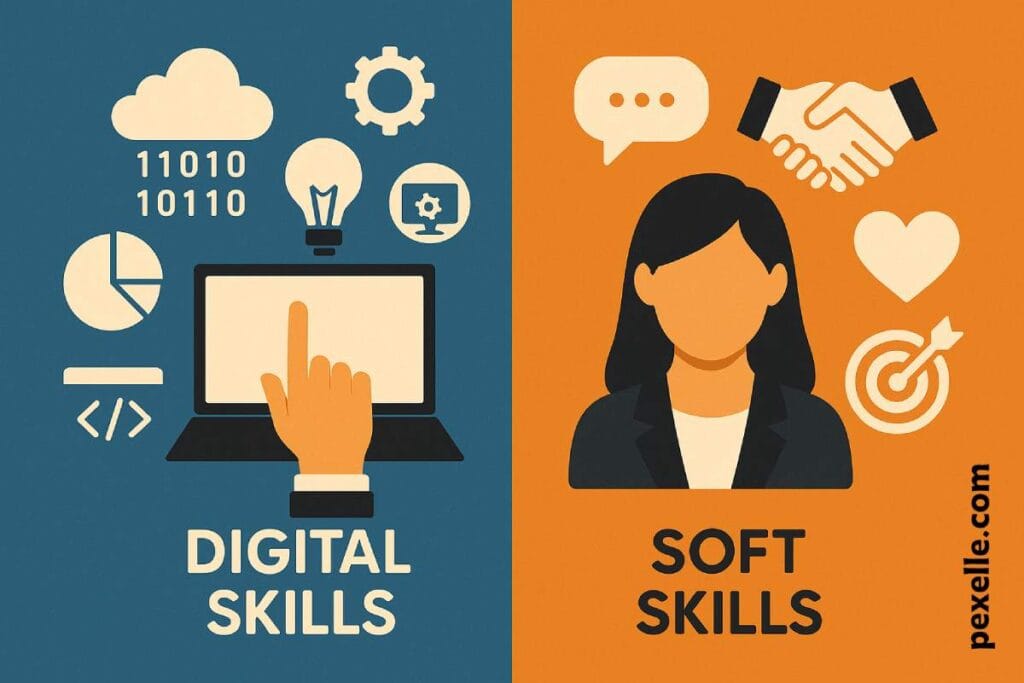The Difference Between Digital Skills and Soft Skills: A Comprehensive Guide

1. Introduction: Understanding the Two Skill Categories
In the modern workplace, success depends not only on technical knowledge but also on interpersonal and cognitive abilities. Digital Skills refer to the technical capabilities required to use, manage, and create digital technologies, while Soft Skills encompass interpersonal traits, communication abilities, and problem-solving approaches. While both are crucial, they serve different purposes and complement each other in achieving career and business goals.
2. Defining Digital Skills
Digital Skills are the abilities needed to operate and interact with technology effectively. They range from basic skills—such as using word processors, email, and search engines—to advanced capabilities like programming, data analytics, cloud computing, cybersecurity, and artificial intelligence. These skills enable individuals to navigate the digital environment, increase efficiency, and contribute to innovation in their respective industries.
3. Defining Soft Skills
Soft Skills are personal attributes that influence how effectively people interact and work together. Examples include communication, teamwork, emotional intelligence, adaptability, leadership, and time management. Unlike Digital Skills, which are often task-specific, Soft Skills are transferable across industries and roles, making them essential for collaboration, conflict resolution, and leadership.
4. Key Differences Between Digital and Soft Skills
The main distinction lies in their nature and application. Digital Skills are technical and tool-based, often learned through formal education, training, or self-study. Soft Skills, on the other hand, are behavioral and interaction-based, developed through experience, reflection, and practice. While Digital Skills can often be tested through measurable tasks, Soft Skills are more subjective and assessed through observation and feedback.
5. How Digital Skills and Soft Skills Complement Each Other
In the workplace, Digital Skills without Soft Skills can lead to technical competence but poor collaboration, while Soft Skills without Digital Skills can limit productivity in tech-driven environments. For example, a data analyst may be highly proficient in statistical software but needs communication skills to present insights effectively. Combining both skill sets ensures a balanced professional profile that meets modern workforce demands.
6. Examples Across Industries
- Digital Skills: Coding in JavaScript, using CAD software for engineering, creating marketing campaigns using social media analytics tools.
- Soft Skills: Negotiating contracts, leading a project team, resolving workplace conflicts, adapting to cultural diversity in global markets.
In industries like healthcare, finance, or education, both skill types are increasingly intertwined, as professionals must navigate digital platforms while engaging empathetically with clients, patients, or students.
7. The Role of Digital Transformation
Digital transformation in businesses has amplified the need for both skill types. As automation and artificial intelligence take over repetitive tasks, workers must adapt by upgrading their Digital Skills while strengthening Soft Skills like critical thinking, creativity, and adaptability to work alongside emerging technologies.
8. Building and Balancing Both Skill Sets
To succeed in today’s competitive environment, individuals should adopt a continuous learning mindset. Digital Skills can be improved through online courses, certifications, and hands-on projects, while Soft Skills can be developed through mentorship, networking, teamwork experiences, and active self-improvement practices. Employers increasingly value candidates who demonstrate both technical competence and strong interpersonal capabilities.
9. Conclusion: The Future of Skills in the Workplace
The future of work will demand a balanced blend of Digital and Soft Skills. Technical expertise will open the door to opportunities, but Soft Skills will determine long-term career success and leadership potential. Professionals who invest in both areas will be better equipped to thrive in a rapidly evolving global economy.
Source : Medium.com




